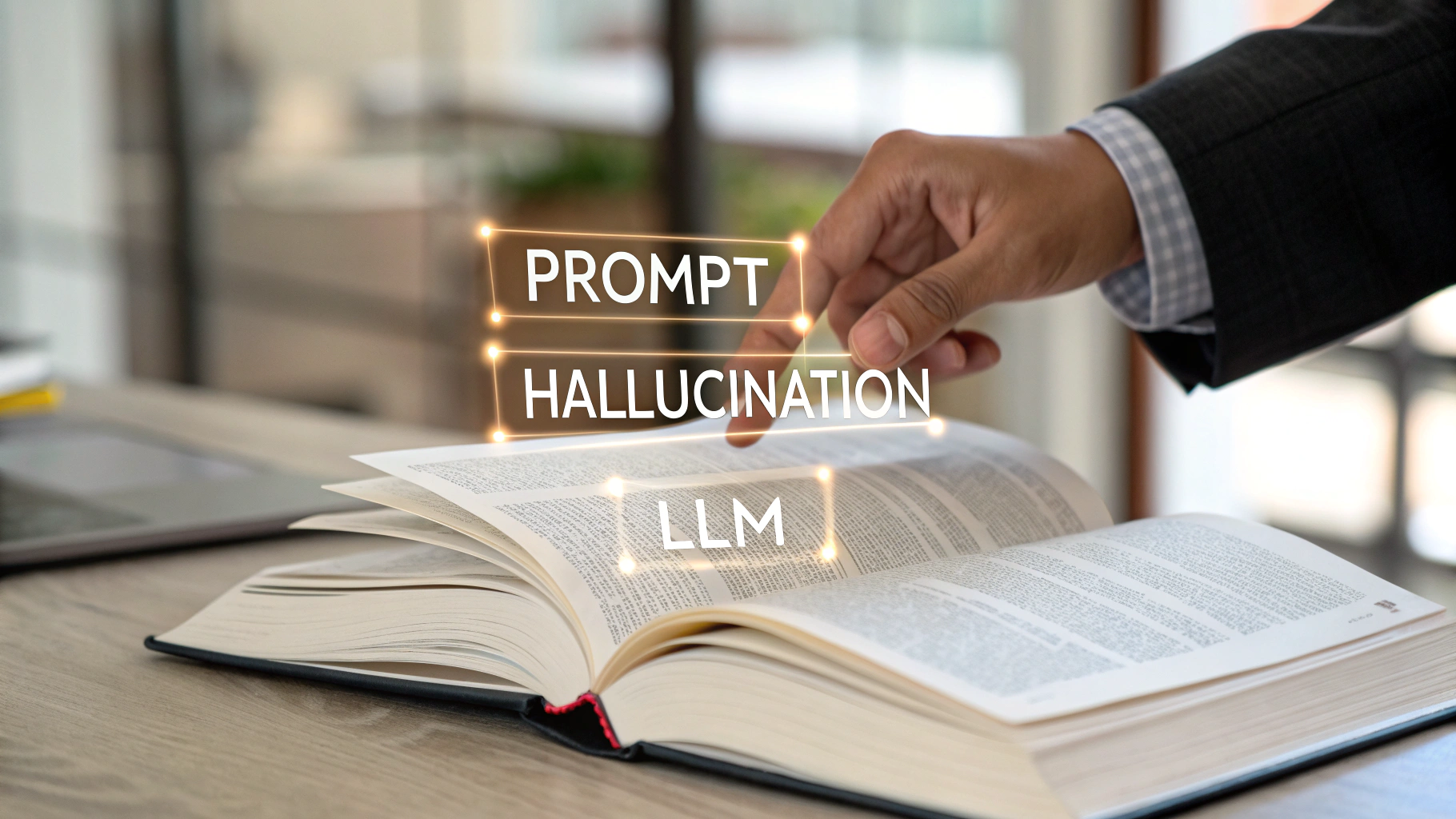
AI Glossary for Legal Professionals
Foundational Concepts
1. Artificial Intelligence (AI)
The simulation of human intelligence in machines programmed to think and learn, enabling tasks like content generation, data analysis, and client communication automation in legal marketing.
2. Machine Learning (ML)
A subset of AI where systems improve performance through experience without explicit programming, allowing legal marketers to predict client behaviors and personalize content based on past interactions.
3. Natural Language Processing (NLP)
Technology that enables computers to understand, interpret, and respond to human language, powering legal marketing tools like automated content generation and sentiment analysis of client feedback.
4. Algorithm
A set of rules or instructions followed by computers to solve problems or perform tasks, forming the foundation of marketing automation systems that segment legal audiences and deliver targeted messaging.
5. Large Language Model (LLM)
An AI system trained on vast amounts of text data to generate human-like content, like Claude or ChatGPT, which legal marketers can use to draft blogs, social media posts, and client communications.
Marketing Applications
6. Predictive Analytics
Using historical data and statistical algorithms to forecast future outcomes, helping legal marketers identify which practice areas to promote and which prospects are most likely to convert.
7. Content Generation
The use of AI to automatically create or assist in creating marketing materials such as blog posts, social media content, and email campaigns tailored to specific legal audiences.
8. Sentiment Analysis
AI technology that identifies and categorizes opinions in text to determine attitudes toward your firm, allowing legal marketers to monitor brand reputation and client satisfaction.
9. Client Segmentation
The AI-powered process of dividing a law firm's client base into distinct groups with similar characteristics to enable more targeted and effective marketing campaigns.
10. Marketing Automation
Software platforms that use AI to streamline, automate, and measure marketing tasks and workflows, enabling law firms to nurture prospects through the client journey with minimal manual effort.
Implementation Concepts
11. Prompt Engineering
The craft of designing effective instructions for AI systems to produce desired outputs, critical for legal marketers seeking to generate compliant and brand-consistent content.
12. Augmented Intelligence
The partnership between humans and AI where technology enhances human capabilities rather than replacing them, enabling legal marketers to scale efforts while maintaining quality control.
13. Training Data
The information used to teach AI systems how to perform tasks, which for legal marketing should include firm-specific terminology, compliance requirements, and audience preferences.
14. AI Governance
The framework of policies and practices that guide the ethical and effective use of AI within an organization, essential for legal marketers to maintain compliance and brand integrity.
15. Personalization Engine
AI-powered systems that dynamically tailor content to individual users based on their behavior and preferences, allowing law firms to deliver highly relevant marketing messages to prospects.
Ethical and Legal Considerations
16. AI Ethics
The branch of ethics focused on moral principles governing AI development and use, including considerations like ensuring marketing claims generated by AI remain factually accurate and compliant with legal advertising rules.
17. Hallucination (AI)
When an AI system confidently generates incorrect or fabricated information, presenting a significant risk for legal marketers who must ensure all content meets professional standards and regulatory requirements.
18. Bias Mitigation
Techniques to identify and reduce unfair prejudice in AI systems, essential for legal marketers to ensure their messaging appeals equitably to diverse client populations.
19. Explainable AI (XAI)
AI systems designed to make their operations and outputs transparent and understandable to humans, helping legal marketers justify and refine their targeting and messaging strategies.
20. Privacy-Preserving AI
Techniques that allow AI to analyze data and generate insights while protecting sensitive information, crucial for legal marketers handling confidential client data while developing targeted campaigns.
Advanced Concepts
21. Human-in-the-Loop (HITL)
An AI implementation approach where human oversight is integrated into automated processes, essential for legal marketers to maintain compliance and ensure all AI-generated content meets professional standards before publication.
22. Zero-Shot Prompting
The technique of instructing an AI to perform a task without providing explicit examples, allowing legal marketers to quickly generate content for new practice areas or client scenarios without extensive training data.
23. Few-Shot Prompting
Providing an AI with a small number of examples to guide its responses, ideal for legal marketers who need to maintain consistent brand voice across multiple content pieces with minimal setup.
24. Chain-of-Thought Prompting
A technique that instructs AI to show its reasoning process step-by-step, helping legal marketers understand how the system arrived at recommended marketing strategies or content suggestions.
25. Agentic AI
AI systems that can autonomously plan and execute tasks to achieve specified goals, such as scheduling social media posts, monitoring engagement metrics, and adjusting marketing campaigns for law firms without constant human intervention.
26. Retrieval-Augmented Generation (RAG)
A system that enhances AI content generation by retrieving relevant information from a knowledge base, allowing legal marketers to create content that incorporates firm-specific expertise and precedent.
27. Fine-Tuning
The process of adapting a pre-trained AI model to perform specific tasks using additional training data, enabling legal marketers to customize AI systems to understand their firm's unique terminology and style guidelines.
28. Synthetic Data
Artificially generated information that mimics real data characteristics without exposing sensitive client information, useful for legal marketers who need to develop targeting strategies while maintaining confidentiality.
29. AI Hallucination Mitigation
Strategies and techniques to prevent AI systems from generating false or misleading information, crucial for legal marketers who must ensure all content meets ethical guidelines and regulatory requirements.
30. Multi-Modal AI
Systems capable of processing and generating multiple types of data (text, images, audio), enabling legal marketers to create comprehensive campaigns across various channels with consistent messaging.